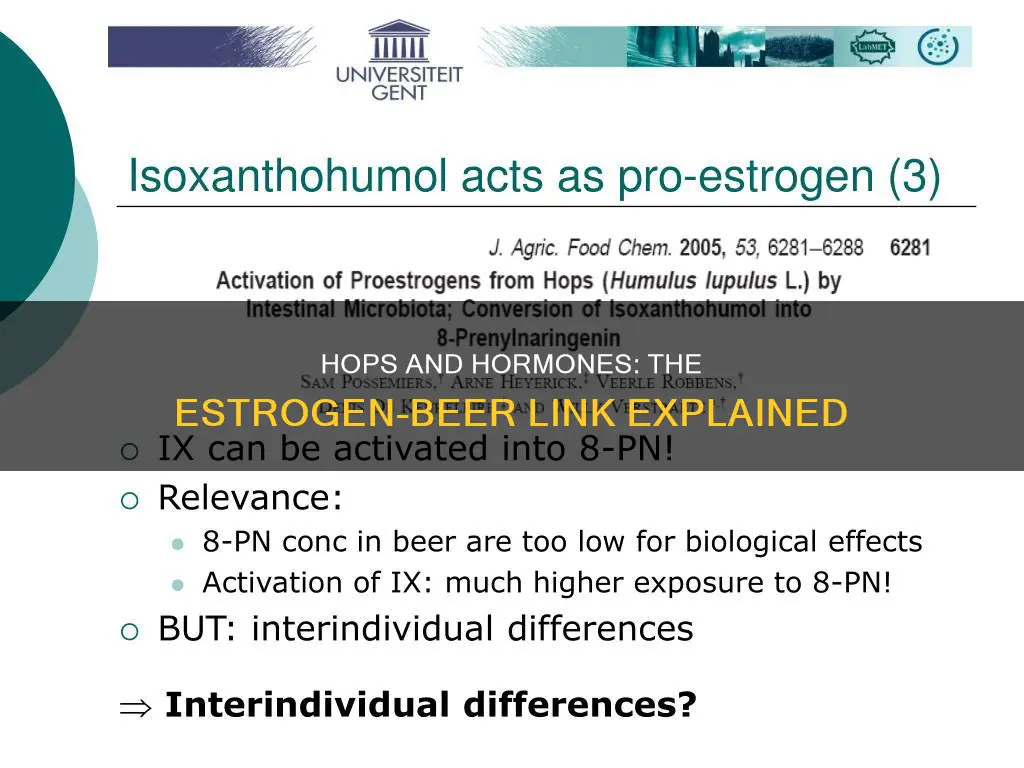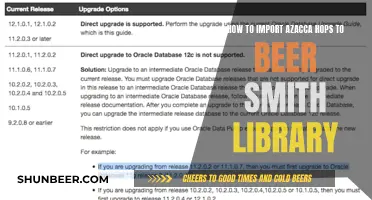
Hops, the bittering agent used to make beer, contain a potent phytoestrogen called 8-prenylnaringenin (8-PN). This compound, which binds to estrogen receptors, is one of the most potent phytoestrogens discovered to date—fifty times more potent than the genistein in soy. The presence of 8-PN in hops may explain the menstrual disturbances experienced by female hop workers in the past.
The estrogenic effects of 8-PN have also been linked to man boobs and erectile dysfunction in men who drink beer. However, the amount of 8-PN in beer is considered too low to affect human health significantly. Nevertheless, the impact of beer consumption on estrogen levels is a complex topic that requires further study, especially considering individual factors and differences in metabolism.
| Characteristics | Values |
|---|---|
| Do beer hops contain estrogen? | Yes, beer hops contain a phytoestrogen called 8-prenylnaringenin (8-PN) |
| Is 8-PN potent? | Yes, it is the most potent phytoestrogen found to date |
| What are the effects of 8-PN? | 8-PN has been linked to menstrual disturbances in female hop workers, and is also marketed as a natural breast enhancer |
| Is 8-PN present in beer? | Yes, but the levels are low and should not be a cause for concern |
| What are the effects of beer on estrogen levels? | Research suggests that beer consumption can influence estrogen levels, particularly with heavy drinking. However, moderate consumption is unlikely to have a significant impact. |
What You'll Learn
- Hops contain a phytoestrogen called 8-prenylnaringenin (8-PN)
- PN is one of the most potent phytoestrogens known
- PN is being studied for pharmacological uses, including inhibiting breast cancer
- Hops have a long history in folk medicine
- PN is present in beer, but the levels are low and shouldn't cause concern

Hops contain a phytoestrogen called 8-prenylnaringenin (8-PN)
Hops, the female flowers of the hop plant, are used as a preservative and flavouring agent in beer. A recurring suggestion has been that hops have a powerful estrogenic activity, and that beer may also be estrogenic. This is because hops contain a phytoestrogen called 8-prenylnaringenin (8-PN), which has an activity greater than other established plant estrogens. 8-PN is one of the most potent phytoestrogens found to date.
The presence of 8-PN in hops may explain the reports of menstrual disturbances in female hop workers. 8-PN can also be detected in beer, but the levels are low and are not expected to cause concern. However, 8-PN is a selective estrogen receptor alpha promoter, and its effects on health are still being studied.
The hop flower has a long history in folk medicine. Female hop pickers would fall asleep in the meadows, and hop baths were used by Germans to reduce hot flashes. Today, hop flower herbal supplements are marketed as natural breast enhancers.
The amount of 8-PN in beer is very low, and an explicit link between drinking beer and male breast development has never been documented. However, the liver and the human colon, which contains trillions of microorganisms, can convert other compounds in hops into 8-PN. This means that the activity of intestinal microbial communities could increase exposure to 8-PN.
Hops: Brewing Demand and Future Growth
You may want to see also

8-PN is one of the most potent phytoestrogens known
8-prenylnaringenin (8-PN) is a prenylated flavonoid, occurring in hop and other plants. It is one of the most potent phytoestrogens known, with an activity greater than other established plant estrogens. It is produced by the female flowers of the hop plant, which are used as a preservative and flavouring agent in beer. 8-PN has been identified as the cause of menstrual disturbances in female hop workers.
Sour Beers: Do They Have Hops?
You may want to see also

8-PN is being studied for pharmacological uses, including inhibiting breast cancer
8-prenylnaringenin (8-PN) is a phytoestrogen found in hops and beer. It is the most potent phytoestrogen known so far, with an activity greater than other established plant estrogens. It has been studied for its pharmacological uses, including inhibiting breast cancer. 8-PN has been found to have anticancerogenic activities, and it is more active against estrogen-dependent breast cancer cell lines than other phytoestrogens. It has been shown to induce apoptosis in cancer cells and upregulate the function of the E-cadherin/catenin complex in human mammary carcinoma cells.
Hemp and Hops: Exploring the Botanical Cousins
You may want to see also

Hops have a long history in folk medicine
Hops have been used in a variety of ways to treat these ailments, including in hop pillows, baths, salves, compresses, and tea. Hops are also commonly served as beer or as a flavoring in kombucha or other fermented beverages.
Wheat Beer and Hops: An Unlikely Friendship
You may want to see also

8-PN is present in beer, but the levels are low and shouldn't cause concern
8-prenylnaringenin (8-PN) is a phytoestrogen found in hops and beer. It is the most estrogenic phytoestrogen known and is responsible for the estrogenic effects of hops. It has been shown to preserve bone density and reduce hot flashes. It is also comparable to some selective estrogen-receptor modulators.
However, 8-PN is present in beer at low levels and is unlikely to have an estrogenic effect in breast tissue. In an in vivo study, 8-PN did not increase uterus weight or induce mitotic activity of vaginal epithelia in mice, even at high doses.
Hops in Beer: Vegetable or Not?
You may want to see also
Frequently asked questions
Beer hops contain phytoestrogens, which are plant-based compounds that mimic estrogen. The most potent phytoestrogen found in hops is 8-prenylnaringenin (8-PN).
Estrogen is a hormone that plays a vital role in both men and women's bodies. It regulates menstrual cycles, promotes fertility, and affects bone density. An estrogen imbalance can lead to health issues such as breast cancer, weight gain, mood swings, and osteoporosis.
Studies have shown that alcohol intake, including beer, can influence estrogen levels. Heavy drinking has been linked to increased estradiol, a form of estrogen, in men. However, moderate beer consumption is unlikely to significantly impact overall hormone balance.
Excessive beer consumption can lead to weight gain, liver damage, impaired judgment, and addiction. It can also interfere with certain medications and increase the risk of breast cancer. Therefore, it is important to consume beer in moderation to maintain a healthy hormonal balance.







